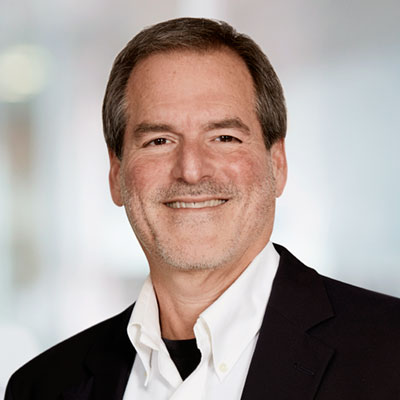For GSK R&D Head Hal Barron 'There's No Place Like Home' For Seeding Innovation
Executive Summary
GSK President R&D Hal Barron came to a big investor meeting with one bit of tangible news, a collaboration with consumer genetics leader 23andMe. Barron and CEO Emma Walmsley talked about the deal and Barron's California headquarters in a media briefing.
For Hal Barron, a Californian who now heads global R&D for GlaxoSmithKline PLC, there's no place like home when it comes to the convergence of science and technology -- and his view has the full backing of his UK-based CEO, Emma Walmsley. The chief executive said she believes having Barron based in the San Francisco Bay area will help advance medical research and promote the culture change GSK needs.
Walmsley and Barron held a media briefing July 25, just ahead of presenting a new R&D strategy to investors and the same day as the company's second quarter financial results. The meeting was the first chance for Barron to talk to investors about his strategy for over-hauling R&D at GSK, though his comments were mainly high-level and did not get into specifics.
Barron, who was tapped late last year to revamp GSK's R&D operations, says his near-30 years based in the Bay Area -- and the contacts built there through engaging with academia, technology companies and his days at Genentech Inc. -- have taught him key lessons that he wants to bring to the UK's biggest pharmaceuticals company for developing innovative medicines more quickly and more efficiently. Walmsley recruited Barron as her R&D chief late last year, which piqued interest on Wall Street given his stellar credentials. (Also see "GSK Bags Barron As R&D Boss As Vallance Joins UK Government" - Scrip, 8 Nov, 2017.)
Bay Area Insights
"What I've seen during the last 29 years in the Bay Area is a culture that spans technology, venture capitalism, biotech, and there are many unique aspects to this. One is leveraging technology and science to see the synergy they can provide, which is largely driven by venture capitalists because what you see from them is a rigorous focus on data but a resolute belief that you can't fear failure," Barron said.
"Venture capitalists have a model in which they essentially say, 'I'm going to take 10 bets and I'm pretty sure nine of those are going to fail but I'm okay with that because the tenth is going to have enough return that makes this a great idea!' So, let's invest in exciting stuff, and kill it when it doesn't work." - GSK R&D Head Hal Barron
"Venture capitalists have a model in which they essentially say, 'I'm going to take 10 bets and I'm pretty sure nine of those are going to fail but I'm okay with that because the tenth is going to have enough return that makes this a great idea!' So, let's invest in exciting stuff, and kill it when it doesn't work," he said.
In efforts to re-invigorate drug development at GSK, Barron said he will center on ways to modulate the immune system, leveraging the vast amounts of human genetic data now being generated, analyzing this complex data with machine learning and creating an accountable culture where smart risk-taking is rewarded.
"This combination of science, technology and culture will generate new insights, improve our probability of success, enable us to focus and, most importantly, create new medicines that will have important benefits for patients,” he said.
23andMe Alliance
An example of how Barron might leverage these scientific goals with connections gleaned in the Bay Area and elsewhere was unveiled the same day in the form of a wide-ranging partnership with California-based 23andMe Inc., including a $300m equity investment in the Silicon Valley gene testing company and a four-year exclusive collaboration in drug discovery.
With more than 5 million customers, 23andMe is now the world's largest genetic and phenotypic resource. More than 80% of its customer base has consented to take part in research, offering the prospect of aggregated and de-identified data being used to enable the discovery of many novel associations from a diverse range of people,

"We know that drug targets with genetic validation have a significantly higher chance of ultimately demonstrating benefit for patients and becoming medicines," Barron said. "Partnering with 23andMe will help to shift our research and development organization to be driven by genetics," he added.
To allow work to commence immediately, the deal enables both companies to bring existing early-stage programs within the collaboration. 23andMe has a portfolio of early-stage therapeutic research programs across a wide range of disease indications, which will be assessed for inclusion. GSK will initially contribute its LRRK2 inhibitor, which is currently in pre-clinical development as a potential treatment for Parkinson’s disease.
The parties said that in order to promote "broader and ongoing engagement within the scientific community" they plan to publish results of research conducted within their collaboration.
The leadership at 23andMe also circles back to Genentech. Chief Science Officer Richard Scheller worked at Genentech for 14 years, retiring in December 2014. Scheller talked about the collaboration during GSK's investor presentation, noting that it originated out of lengthy conversations with Barron.
"We weren't necessarily looking for a partner at this point in time, but as Hal and I often talked to each other ... it just became clear that GSK could bring this, 23andMe could bring that, such that it was just clear that this was the way for us at the time to proceed," Scheller said. He said the deal presents a lot of opportunities because while 23andMe is good at discovering antibodies and drug targets, it doesn't have the wherewithal to pursue developing them. "Working closely with GSK we can potentially start some of those projects," he said.
CEO Walmsley said the deal helps confirm in her mind that her choice of Barron was the correct one
She initially had doubts about the practicality of having her global biopharma R&D chief based somewhere eight hours behind London's time zone, but she was soon convinced that the upsides offset any downsides -- indeed, the arrangement has had some unexpected benefits.
"It's been one of the unintended benefits; we know we all can fall into the trap of being activity-based rather than outcome-based … and the time zone difference has helped us already to make corporate meetings more efficient and shorter. That has been the case at board level all the way down and across the R&D team," the CEO said.
"The networking and connectivity that Hal has out in the Bay Area is highly relevant to our new focus and we can announce one aspect of that today with the 23andMe R&D alliance," she added.
